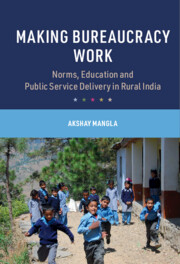Book contents
- Making Bureaucracy Work
- Cambridge Studies in the Comparative Politics of Education
- Making Bureaucracy Work
- Copyright page
- Dedication
- Contents
- Figures
- Tables
- Acknowledgments
- Abbreviations
- Part I Introduction, Puzzles and Theory
- Part II Implementing Primary Education in Northern India
- 4 How Legalistic Bureaucracy Generates Uneven Implementation
- 5 How Deliberative Bureaucracy Facilitates Adaptive Implementation
- 6 Norm Persistence
- 7 Norm Change
- Part III Comparative Extensions and Implications
- Appendix: Researching Bureaucracy and Frontline Public Services
- References
- Index
7 - Norm Change
Conflict and Commitment on the Front Lines of Reform
from Part II - Implementing Primary Education in Northern India
Published online by Cambridge University Press: 18 November 2022
- Making Bureaucracy Work
- Cambridge Studies in the Comparative Politics of Education
- Making Bureaucracy Work
- Copyright page
- Dedication
- Contents
- Figures
- Tables
- Acknowledgments
- Abbreviations
- Part I Introduction, Puzzles and Theory
- Part II Implementing Primary Education in Northern India
- 4 How Legalistic Bureaucracy Generates Uneven Implementation
- 5 How Deliberative Bureaucracy Facilitates Adaptive Implementation
- 6 Norm Persistence
- 7 Norm Change
- Part III Comparative Extensions and Implications
- Appendix: Researching Bureaucracy and Frontline Public Services
- References
- Index
Summary
Chapter 7 investigates how bureaucratic norms change, analyzing recent institutional reforms in Uttar Pradesh (UP) and Bihar. I first examine Mahila Samakhya in UP, a women’s empowerment program initiated by the central government. Challenging legalistic bureaucratic norms, Mahila Samakhya fostered a subculture of deliberation that inspired frontline worker commitment to institutional activism. Frontline workers countered village caste and patriarchal structures to mobilize Dalit women's associations, a process rife with social conflict. Deliberation with target households supported the integration of disadvantaged girls into school. In Bihar, by contrast, committed state leadership worked to strengthen law and order, encouraging a broad shift toward legalism. Bureaucratic commitment to rules supported the growth of school enrollment and infrastructure provision. However, state initiatives to improve education quality through innovative teaching practices faltered, as they conflicted with administrative rule-following. The findings suggest the difficulties of securing frontline worker commitment to quality reforms on the back of legalistic bureaucracy.
Keywords
- Type
- Chapter
- Information
- Making Bureaucracy WorkNorms, Education and Public Service Delivery in Rural India, pp. 261 - 298Publisher: Cambridge University PressPrint publication year: 2022

